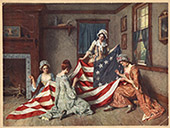Libraries, University of Nebraska-Lincoln
Document Type
Archival Material
Date of this Version
1776
Citation
Haynes, Lemuel. [1776] Liberty Further Extended: Or Free thoughts on the illegality of Slave-keeping; Wherein those arguments that are used in its vindication are plainly confuted. Together with an humble Address to such as are concerned in the practice. Edited by Paul Royster. Regularized text edition; Electronic Texts in American Studies, 2023.
Abstract
This is a regularized text of a private sermon or pamphlet manuscript, authored by a 23-year-old African American who had served in the “minuteman” militia and the Continental Army, and who became an ordained minister and was pastor to white Congregational churches for more than 50 years.
Haynes’ tract is an important and revelatory addition to the early anti-slavery literature in the American colonies. Only identified and published in 1983, it is uniquely situated at the crossroads of independence, anti-slavery, Congregationalism, and African-American identity. Brought to light by Ruth Bogin, the work is testimony to the diversity of thought and experience within the New England and ultimately American experience.
Haynes argues that Africans should have the same rights as Englishmen; natural rights are given from God, and cannot be surrendered or sold. He refutes some common justifications of slavery—that it is justified by the curse of Canaan; that imported Africans are prisoners who would otherwise be killed; that the “owners” bought and paid for them; that enslavement brings Africans the benefits of Christianity. Liberty and freedom as defined in the political anti-British space, are applied to the African question, as was also done by other colonial anti-slavery writers in the era of the Revolution; none of whom, however, were black.
Produced here is an accessible text that renders Haynes’ somewhat unorthodox spelling into prose recognizable to the common reader.



Comments
Released under a CC-0 license. The underlying text is public domain.